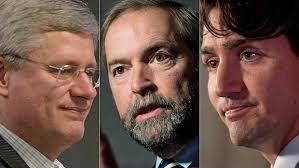The politicians and the pundits seem to be agreed. Like it or not, the campaign for the next federal election has already begun. True, the actual election is not supposed to happen until Oct. 19, 2015, roughly 390 days down the road, but that’s irrelevant. It was clear when MPs returned from their long summer recess that the business of the coming 13 months will have much less to do with legislating and governing than it will with electioneering.
Normally, with Parliament about to resume, as it did last Monday, the prime minister would assemble the government caucus on Parliament Hill to brief his MPs and senators with earnest words about the parliamentary timetable. This time, however, the Conservatives abandoned their caucus room for a rented hall in downtown Ottawa where they could whoop and holler in what looked like a cross between an old-time revival meeting and a high school pep rally. Their head cheerleader (a.k.a. prime minister) strode the stage, whipping his energized troops into what might be described as a bit of an excited lather.
The election excitement doesn’t mean, as some pundits suspect, that the Conservatives are plotting to call an election earlier than next October; that’s possible but, barring a dramatic turnaround in the polls, the odds are heavily against it. It also doesn’t mean that there is something happening on the leadership front — either that Harper is preparing to leave politics or, alternatively, that he has made up his mind to fight the election and carry on when it is over.
My sense is that Harper, a cautious man, is keeping all his options open — maybe an early election, maybe not; maybe a leadership convention, maybe not. He knows he has a leadership window that, although it is narrowing, will remain open until late February or early March next year. If he resigns by then, there will be time for a hurried but not-too frantic transition: a convention in late May or early June, followed by a short parliamentary session in which the new prime minister could establish himself or herself, followed by the election on schedule in October.
There is no indication, however, that Harper will go that route. Whipping the troops into election mode does not commit him to leading the party into his fifth election. But it serves as an opening gambit to see if he can move the polls and voters, especially in Ontario, away from Justin Trudeau’s Liberals and back to the Tories.
That’s not going to be easy. To do it, he is going to have to change the so-called “ballot question.” The Conservatives want the ballot question to be the economy and their success in managing it by finally turning years of deficit into a surplus. But, as they are acutely aware, the ballot question they would face in an election today has little to do with the economy. It is all about Stephen Harper himself. As people tell pollsters, they are tired of him. They don’t like him. He bores them. They just want a change of leadership.
This is not a new phenomenon. It happened to Pierre Trudeau and to Brian Mulroney.
By election time next year, Harper will have been in power for virtually a decade. In the internet age, a decade is an eternity. If the desire for change is strong enough, the presumed deficiencies of the other national leaders won’t save Harper. People will vote for whichever party and leader they think offers the best chance of getting rid of Harper and his Tory government.
It’s a fascinating situation. You would think that Harper would have to change, to re-invent himself. But how would he do that? He is not a political chameleon. He cannot make himself as charismatic as Trudeau or as passionate as Thomas Mulcair. Like his political soulmate, Britain’s Margaret Thatcher, Harper is not for turning or changing. He is what he is, for better or worse.
Cambridge resident Geoffrey Stevens, an author and former Ottawa columnist and managing editor of the Globe and Mail, teaches political science at Wilfrid Laurier University and the University of Guelph. His column appears on Mondays in Waterloo Region Record and Guelph Mercury. He welcomes comments at geoffstevens[at]sympatico.ca.



